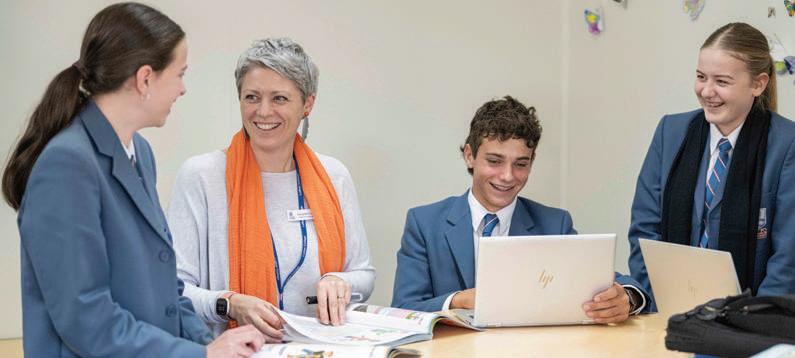
11 minute read
Georgie
Collyer Head of Languages
In her own words.
As Head of Languages at Luther College I work with an outstanding team of Chinese, German and Indonesian teachers to develop engaging language programs for all our students. It’s also my job to foster relationships with overseas sister schools and organise exchanges and local cultural immersion opportunities.
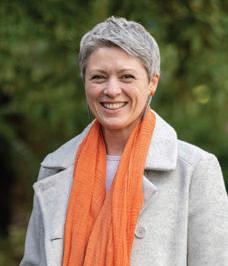
Tell us a little about yourself. My first years of teaching were at the Timbertop Campus of Geelong Grammar School, where students boarded full-time. I loved being in loco parentis to students there, and pastoral care has continued to be central to my teaching. Following a brief tenure at Monbulk College, I started at Luther College. This was around the time of the 2006 Commonwealth Games in Melbourne and, in the time since, I have taught German, Music, Commerce and Christian Studies. I also teach a new subject called The Memory Code, in which students learn how to use ancient and modern memory methods to develop strategies and tools for improving their focus, creative thinking and memory.
And your goals for the Languages program?
I am often asked what the point of learning a language is, when English is the most common lingua franca and Google can translate anything. Advances in artificial intelligence certainly influence the way we interact with language, and so we are driven to reflect on what is most important for our students. Being able to communicate in another language provides a lens through which we can engage intimately with another culture. Only through deep understanding of our neighbours, both domestically and overseas, can we expect harmony to develop between the peoples of our world. Learning a language is accessible for everyone and stimulates students to engage more with their own language.
Recent proud moments?
I am proud of a team that has built a name for its thriving program. Our students are independent learners and through targeted teaching and enrichment, students are not only achieving excellence in comparison with statewide achievement measures, but they know the value of diversity and difference.
What are you excited about?
We have our first group of students taking VCE Chinese Units 3 & 4 this year, and I am so excited for these students. So much work goes into building a curriculum and I thank Mrs Shanshan Wang for her leadership in this over the last six years. I am also thrilled that we are resuming in-country experiences for students studying a language in the senior years.
Fav thing about working with young people?
Possibility. The world will change a lot in the next 50 years, and our young people will book
Fav movie
The Sound of Music (my favourite from childhood)
Fav Food
Any Thai curry
Fav travel destination
Germany, of course
Best advice you have received be the ones to drive that change. They will be globally connected, in their careers and socially. My motivation is to help students to connect with their dreams and see them follow those dreams courageously, energetically, creatively and lovingly.
Make your choice and give it all you’ve got. If it turns out you’ve taken the wrong turn, change tracks and give it your all, all over again.
Kelli Ashton Head of Humanities and Social Sciences
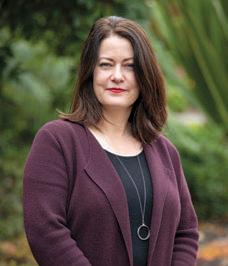
In her own words.
As Head of Humanities and Social Sciences (HASS), I provide leadership and oversight of the following subject areas across the college.
• The study of Economics and Business which equips students with knowledge of Australian and global economies while empowering them to secure their financial futures and participate in and contribute to the wellbeing and sustainability of the economy, environment and society.
• Civics and Citizenship which explores the civic rights and responsibilities through the choice of governments, law and the legal systems to protect people’s rights and the influence of groups and individuals.
• Through the study of Geography which encourages students to question and be curious when learning about the diversity of the world’s people, cultures and environments.
• Inquiry into the past with History which develops students’ curiosity and imagination; awareness of how decisions and actions from the past influence society today.
Tell us a little about yourself.
I started teaching 25 years ago at Padua College, after four years there I moved to Luther College as the Geography Coordinator and then Humanities Coordinator before taking maternity leave. I have been afforded many opportunities throughout my years at the college most notably developing the Year 10 City Experience with colleague David Paech which still runs today as well as having several Year 7-10 Humanities and VCE Geography textbooks and resources published through Pearson Education, The Geography Teachers Association of Victoria, CFA, AusAID and Oxford University Press.
And your goals for the Humanities and Social Sciences program?
Interconnectedness and sustainability are common threads through the HASS subjects. Our goal as a learning area is to enhance student understanding of these concepts by looking for meaningful connections and deeper learning across the four strands of HASS. Imagine a unit on Globalisation, which is all about interconnectedness, that weaves together the curriculum links and concepts from business, geography economics and politics. Our students have such a strong awareness of the issues facing the world, by embedding the concepts of sustainability we can enhance their ability to see the power of innovation, imagination and creativity in solutions to social and environmental challenges.
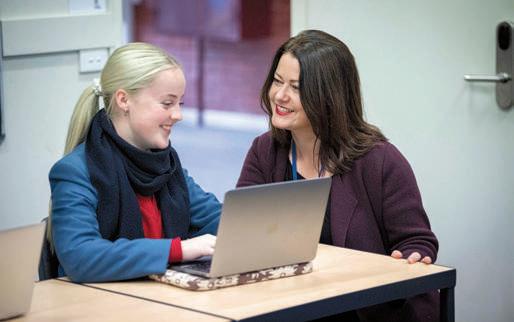
Recent proud moments?
There is so much to be proud of! I am most proud and inspired by the amazing dedication from all the HASS staff. Each of the teachers is passionate about their subject and work to develop learning experiences for students to achieve their best.
The Senior Humanities staff have recently moved into a newly refurbished office, I love hearing the learning discussions, sharing of ideas and the laughter this open and bright space has facilitated.
What are you excited about?
The HASS department is perfectly positioned to encourage our students to be engaged and informed citizens. Every week there is something happening in the HASS department both on and off campus. With activities ranging from geography excursions to Cape Schanck to explore the natural processes shaping the coast, to the Western Port to assess the impacts of sand mines expansion into remnant woodlands. The Year 10 History classes once in a lifetime opportunity to ask a Holocaust survivor questions or one of the characters in Ned Kelly’s trial at the Old Melbourne Gaol. Economics classes analysing the 2023 Budget and Youth Trade Expo in
Fav book
Too many to list!
Fav movie The Godfather
Fav Food Thai food
Fav travel destination Italy
Best advice you have received
Ordinary people are capable of extra-ordinary things.
VCE Business Management and the entire Year 8 cohort participating in Civics week to understand Australia’s system of democratic government and law and run a preferential vote to see which studentformed party wins the “election” complete with voting booths and ballot boxes.
Fav thing about working with young people?
When students tell you that you’ve made a difference.
Alysha Schneider
Head of Science
In her own words.
I am fortunate to work with a range of experienced and passionate Chemistry, Biology, Physics, Psychology and Environmental Science educators.

All Year 7-9 students study a year of General Science, then in Year 10 complete a semester of Science, either Core Science or Challenge Science. Half of the Year 10 cohort also will complete a semester of Forensic Science, an elective subject that is incredibly popular!
Additional electives include Year 10 ‘Advanced Investigation’ and in Year 9 ‘Mythbusting Science’. Year 9 Psychology continues to be a popular option, offering a pathway into VCE Psychology.
We have around three classes of VCE Biology, Chemistry, Psychology and Physics subjects at Year 11 and 12, with Environmental Science being introduced in 2022. We have Environmental Science classes for both Unit 1&2, and Unit 3&4 in 2023 which is a fantastic option for our climate change warriors! We currently have 20 different Science subjects on offer, with a team of 19 amazing staff supporting the learning area.
Tell us a little about yourself.
I started my teaching journey at Dromana Secondary College in 2010. I feel very lucky to have been able to continue my work as a VCE Chemistry teacher every year since, commuting for a short amount of time to Melbourne Grammar, before moving on to Lakeside Lutheran College. It was at Lakeside where I was able to experience leading the Science team, also working with primary students and community engagement, as well as developing the VCE Biology program. I moved to Luther College in 2016 as a VCE Chemistry and Year 9&10 Science teacher and immediately felt at home.
And your goals for the Science program?
We are currently updating our Year 7-10 Science Course Outlines as a team, fully aligned to the new 9.0 Australian Curriculum. We have been working for a number of years, to embed key science skills as part of our ongoing investigations and want to make the deliberate scaffolding of the skills involved in the scientific method apparent for all learners. Our Science teachers are very keen to link current events and real-life working examples, as well as sourcing the very best learning materials available for our students. We have been working to audit our current summative assessment practices, to ensure Year 7-10 students have access to the specified VCE Science Assessment tasks prior to starting their Year 11 & 12 studies. Other goals include the deliberate celebration of indigenous culture and scientific knowledge, inclusion of sustainability as a focus in all Year 7-12 Science units, and the development of a college STEAM (science, technology, engineering, arts and mathematics) extra-curricular club.
Recent proud moments?
It has been excellent to welcome guest speakers back on campus within our VCE Chemistry and Year 10 Forensic Science classes (a huge thank you to Carolyn Childs and Jenelle & Mick Hardiman). We have taken our VCE students to Toolangi Forest, Luna Park, and back to Monash University and KIOSK to use world class instrumental equipment for analysis of various water and organic samples. This semester, our Year 7 cohort was able to partake in the lightening room and planetarium shows at Scienceworks and our Year 10 Core Science students ventured to Melbourne Museum. Ms Ackermann Edwards also organised our first inaugural hikes up Mt Rothwell, as well as our combined Unit 1-4 Environmental Science overnight Zoo Snooze experience. I have enjoyed working with teachers at Good Shephard Lutheran Primary School, where our focus has been the development of Scientific Posters and pedagogical approaches to incorporating student-led experimentation and design.
What are you excited about?
I am excited for many collaborative plans in the works. We are planning for our shared STEAM and SAGE club members to produce their own renewable fuel throughout lunchtimes and we are working with Geography teachers to create transdisciplinary learning opportunities within the Year 7 studies of water and mixture separation, as well as our shared Geology studies in Year 8. We have hopes for our ‘Road to Zero’ Physics excursion in Year 10 to link in as part of the 10 HPE curriculum, with many other suggestions for Arts/Food Technology/Science/Commerce selectives to explore for 2024 and beyond. We continue to source some amazing equipment; we now have our own PCR and Gel Electrophoresis kits to be utilised on-site by VCE Biology classes (as well
Fav book
The Magician by Raymond E Feist
Fav movie
Back to the Future, Inception & Dead Poets Society
Fav Food
Vietnamese or Mexican (I would also never turn down a pizza)
Fav travel destination as Year 10 Science), and a brand-new Vernier Gas Chromatography instrument for our VCE Chemistry (and Year 7 Science) investigation work. Mr Yen has been working closely with Mr Stefanac (Head of Technologies) planning exciting updates to our Telescope and Astronomy club.
Anywhere tropical. Top of the list is to take our two boys to Japan!
Best advice you have received To be kind. Always, for everyone you meet is fighting a battle you know nothing about.
Fav thing about working with young people?
How incredibly resilient and inspiring they are. No class or day is the same in this line of work. Our students open my eyes to viewing a phenomenon through an entirely different lens. I love finding out more about an individual’s passions, and the steps they are taking to master their gifts and talents.
Luther STEAM Club
Our college lunchtime clubs have been busy this semester, with so many activities for students to try.
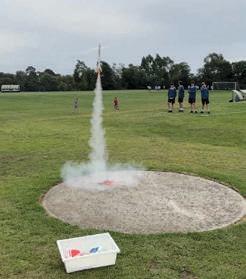
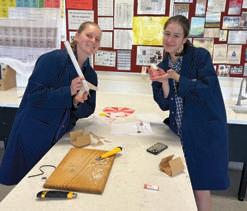
Our STEAM Club (science, technology, engineering, arts and mathematics) spent the semester learning about molecular gastronomy and spherification by making bubble tea, rocket construction and aerodynamics by building and launching rockets, plus the chemistry of tie dye and making stress balls and positivity pebbles, as part of Mental Health Awareness Month. The club is designed to evoke curiosity, to explore news things and problem solve while also help students develop a lifelong love of STEAM learning. Students have also tried their hand at building terrariums and making bath salts.
Zoo snooze for VCE Environmental Science Studies
Our VCE Environmental Science students enjoyed a sleepover at Melbourne Zoo in March, touring behind the scenes and working alongside the passionate and knowledgeable Zookeepers.
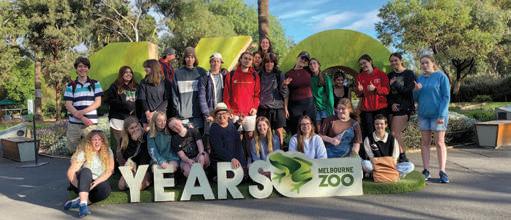
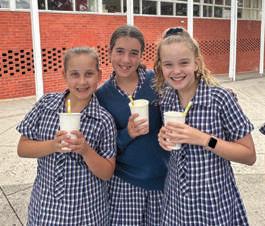
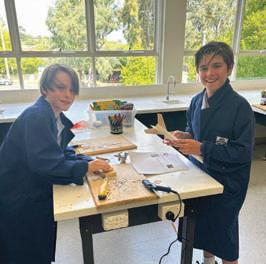
The dusk tour allowed students to see tigers, giraffes, zebras, elephants, and peccaries (to name but a few) by red light, as well as the Lord Howe Island stick insects (there are believed to only be 30 of these creatures living in the wild). All the while discussing biodiversity, classification and how Zoos Victoria is fighting extinction along the way.
Students participated in various sessions throughout the following day, all closely related to their Unit 1-4 coursework. Adaptations, speciation and human impact were explored when learning about the native Corroboree frog (which is only 3cm long!) and key science skills were developed through the Butterfly Ecology program, where primary data was collected in groups.
Physics at Luna Park?
Students undertaking Units 3-4 Physics attended the VCE Physics Day at Luna Park in St Kilda in March.
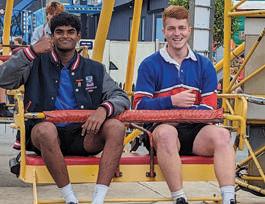
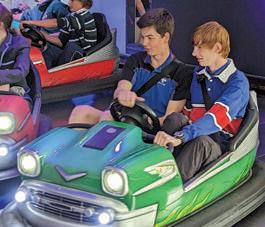
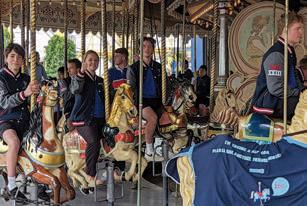
Physics at Luna Park sounds like too much fun right? How could that be related to physics?
These were the questions they explored:
• Why don’t you fall out of the seat when the Enterprise spins you upside down?
• What do you weigh when the pirate ship is at the bottom?
• At what point is the scenic railway fastest?
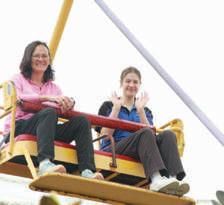
• Why don’t you fly off the carousel?
• How does braking work?
Road to Zero
Year 10 Core Science students visited the Melbourne Museum in March to take part in the Road to Zero experience.
Developed by the TAC, the Road to Zero program comprises two key learning aspects, an immersive exhibition showcasing the latest in interactive technologies, and curriculum-linked programs in the purposebuilt Learning Studio.
Students explored how their body would have to adapt to survive impacts at different speeds as a cyclist, motorcyclist or pedestrian, designed a virtual car with updated safety features for crashtesting and analysed data regarding road safety performance of Victoria compared with other Australian and international jurisdictions.
They also participated in an elevator simulation with a panoramic view of the Royal Exhibition Building. The increasing height of the elevator is used to demonstrate the impact that different speeds on the road can have on our bodies, culminating in a dramatic ‘drop’ from the 11th floor.
It was a great opportunity to investigate and understand the mechanics of movement in real life, away from their calculator and workbooks. Circular Motion is a key part of the Year 12 Physics course and rides such as the Carousel, Spider, Enterprise and Pharaoh’s Curse for the thrill seekers (or the Carousel and Ferris Wheel for the less adventurous teachers!) enabled students to feel the effect of centripetal acceleration in both horizontal and vertical circles. Forces and Energy Transformations were explored as part of the experience, with data collected electronically when riding the Dragon Boat, as well as the famous Scenic Railway. Conservation of Momentum was in action as students experienced collisions in the Dodgem Cars.
There was also a three-minute virtual reality experience where students could travel in a car from 1970 to 2055, learning the history of road safety in Victoria and discovering what a future with zero deaths and serious injuries might look like.
Students then moved into the Learning Studio space, where they built on their classroom learning around motion, applying it to a real-world challenge. Following a facilitator led introduction, students also participated in a physics experiment to explore the relationships between speed and friction on car stopping distances. They then applied their learning to a team-based quiz using touch table technology (which proved incredibly popular).







